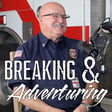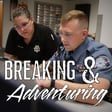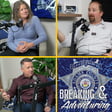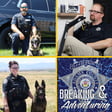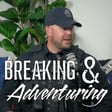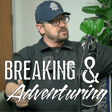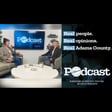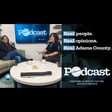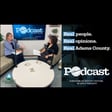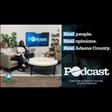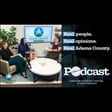Become a Creator today!Start creating today - Share your story with the world!
Start for free
00:00:00
00:00:01

Episode 4 – Welcome to Law Enforcement
In this episode, Sgt. Adam Sherman checks in with two ACSO recruits, Joseph Jimenez and Zack Myers, as they near the finish line at Flatrock Regional Training Academy. Both are military veterans bringing their discipline and dedication to a new mission—serving as law enforcement officers. With POST certification just weeks away, they reflect on why they chose ACSO, what challenges they’ve faced in the academy, and what they hope to accomplish as they step into a new chapter of service.
Do you have questions? We want to answer them. Send us an email to CommunityConnections@adcogov.org.
Recommended
Transcript
00:00:26
Speaker
All right.
Introduction and Recruit Backgrounds
00:00:27
Speaker
I am Sergeant Adam Sherman, and welcome back to another episode of Breaking and Adventuring. A look inside the Adams County Sheriff's Office and and beyond. And so I'm here with my 16 years plus of experience, and we're going to just dive into different topics um and and see what we can find and dig up and some cool, interesting stories. So for today, we've got two of our newest family members.
00:00:53
Speaker
ah We have some of our academy recruits. So we have ah Recruit Jimenez and Recruit Myers here just to talk a little bit about their experiences, what led them to this point, joining the the sheriff's office, and then what they've experienced so far, then where they're looking to go a little bit beyond that.
00:01:08
Speaker
So... Uh, first we'll play a little game called who are you? So, it so whoever wants to start, but yeah, just tell us, you know, like little elevator speech about just who you are and what brought you to this point.
00:01:21
Speaker
Yeah, so I'll go first. ah So my name is Joseph Jimenez. ah Recruit Jimenez if we're being super, super formal. um Before I joined the sheriff's office, I did 10 years in the Marine Corps from about 2010 to 2020. Went to school for a little bit.
00:01:38
Speaker
so Still had that desire to do, ah you know, serve, get back to my community. have a family history of of law enforcement. My grandfather was a state trooper in New Jersey for 30 years.
00:01:49
Speaker
My brother was ah Orange County Sheriff's Office for about six years in Florida before he went federal, HSI. So it's always been something that, one, that I've i've looked into and i have had family history of.
00:02:01
Speaker
Gotcha. you have any family ties to Orlando or was that just something he he did on his own? my brother moved with his mom and stepdad down after he graduated elementary school.
00:02:12
Speaker
Okay. He moved down to stuart the Stewart, Florida area. ah So he went to high school there and was there for, think, like 15-ish years before he made the jump to HSI, where he was up in New Jersey for like four or five years, and then finally got back to Florida.
00:02:29
Speaker
So he's down there now all right doing his thing. But he's he's loving that so far. As a Florida boy myself, anytime I hear that, I'm like, oh, okay, let's hear more about that. My grandmother and my aunt live down there, but ah I grew up in New Jersey.
00:02:43
Speaker
ah He grew up in New Jersey. like We've primarily been in New Jersey, but they moved down there for the last decade. He's been there since like, 2000, 2001. Nice.
00:02:53
Speaker
All right. What about you, Zach? I'm Zach Myers or recruit Myers, if you will. ah I'm from Wyoming, actually. But before that or after that, excuse me, I also served four years in the Marine Corps. was in the infantry and then I actually hopped around a bit when I was going to college, so I did wildland firefighting. And then most recently, I actually worked for Michigan State Police before this. And I've always wanted to be a police officer. I did the military to also help act like get skills to make me a better police officer.
00:03:26
Speaker
okay um And then, yeah, moving from Michigan, moved out here, looked around. Saw that Adams County still gets after it, and that's what I wanted to do. So I... All right.
00:03:36
Speaker
Yeah. That's why I joined me. Where in Michigan were you? Grand Rapids. Okay. Yeah, my wife, she had a ah residency in Grand Rapids. She's a pediatrician. Nice. that's what we were doing out there. Okay. And it was a lot of fun.
00:03:48
Speaker
um I was not a trooper. I was a motor carrier, so semi-trucks and all the commercial vehicle stuff. Gotcha. So we're not certified, so that's why I'm doing the academy again.
00:03:58
Speaker
Gotcha. Okay. So you're doing like inspections and yeah check. still so Yeah, but it's it's different in Michigan because like out here, i know there's the port of entry and all that. We actually still patrol.
00:04:09
Speaker
We have our own. We still get the car with the sweet bubble on top. Oh, that's cool. Yeah. carry our guns and stuff. And I totally missed a great opportunity. i should just showed you like we're in Michigan. you See, I'm not from Michigan. So I choose to not do that. You don't do the hand. All right. That's cool.
00:04:23
Speaker
I'm, I'm yeah. Just like you guys basically. right Yeah. Big yeah square square. Yeah. yeah So, but, ah but for both of you guys kind of alluded to, but what kind of led you for, okay, you know, whether it's family background or was there anything specific that were like, all right, cool. Like I think law enforcement is where, you know, where my passion might be.
Motivations and Academy Life
00:04:43
Speaker
ah For me, it was just growing up. You know, you play war, which gets people to join the military, but it was also cops and robbers. I grew up watching like Westerns and classic movies like that. So that was always kind of the good versus evil thing.
00:04:56
Speaker
Yeah. And i that just kind of kept me down that path of like, yeah, I would like to be ah police officer one day. That is where I want to go with my career. Okay. I would say for me, it's more of after the military where it's like a macro of trying to make things better. It's more yeah know that micro microscopic or just trying to make where i'm or I'm at a better place. Even if it's like 0.0001%, making it better than when I got there.
00:05:26
Speaker
Just for like myself, other people, my family, things like that. There you go. The like little kind of scouts thing, try to leave things a little bit better than you found them kind of thing. Leave your ah fingerprint on. That's awesome.
00:05:38
Speaker
um So you both mentioned ah the academy and you know you're going through the academy process. And so just a little background for for the listeners and viewers. So in Colorado, ah the Post Academy is 22 weeks long and it's academics curriculum, it's scenario-based training, it's skills, pretty much everything you need to go into a enforcement.
00:06:01
Speaker
setting um and that you'll need. you And then of course you go through your kind of your secondary educational career with the on the job FTO experience and things like that. So just kind of frame, frame it up. So out of those 22 weeks, where are you guys at right now? This is week 13, 13. So you're pretty much, you know, we're on the downhill side. Yeah. You're on the other side. That's cool.
00:06:20
Speaker
So what did you do to prepare yourself for entering into a police academy? ah So I would say we're both fairly fortunate for this. ah We got to do the pre-academy for me from the start in September, like that' basically the first week of October through the end of December.
00:06:39
Speaker
So we got to be up at Flat Rock, actually going down to like the divisions, ah sitting at court, ah shadowing court deputies. I got to sit in on a few autopsies.
00:06:52
Speaker
i was fortunate enough to do that. So I got to see a lot of like, what goes on, um, learning about different aspects of CRS before actually getting to the academy. So gotcha I think that really helped.
00:07:02
Speaker
So a little bit, you know, not slower pace, but kind of, you know, you're not being constantly, ah you know, moving through the the faster pace of an academy. You're actually able to ask questions, get immersed in what's going on and what you're being exposed to. Yep. Yeah. That's, it's a lot. That's awesome. There was a lot more time to actually have, Hey, we don't,
00:07:17
Speaker
kind of understand what that specific thing is. Well, okay, well, we have the time. We can go through it, actually really explain it, and then get that understanding before actually going to the academy and having to drink from that fire hose, as they say. Yeah.
00:07:29
Speaker
and now And with that experience, we're able to kind of meet kind kind of you know, leaders in that area. So whether it's, you know, the, the medical examiners or whether it's some of our more seasoned detectives or even some of the, you know, a district attorneys, um things like that, you're able to kind of ask questions to better prepare yourself when you, it's just one thing to sit and like, okay, let's do a report writing class and know what that's like. But it's another thing to be like, oh, here's why a good thorough report is important.
00:07:57
Speaker
The ramifications, you know, of how many eyeballs are going to see that report after you submit it. um Absolutely. Seeing that at the very beginning, as opposed to at the end is huge. I would imagine. But one of those during those round robin weeks we got to do, um we got to shadow some of like the ah DAs that do like traffic court.
00:08:14
Speaker
And I actually got to sit with like the chief of the traffic court. ah Okay. I think her name's Sarah. And she's, she actually like brought up site different citations. Like we don't know actually what's going on until we actually look at the citation. So on the back of the citation, if you don't write anything, all I've got is, okay, this is it.
00:08:32
Speaker
So maybe it gets dismissed because I don't actually know what's going on. Or if you write, it's basically another police report. If you write something well enough, then I can, you know, I have an idea of what's happening and we can, we can go from there and work with it. But Yeah.
00:08:45
Speaker
And that's important too, because you're not just issuing a citation for, as a form of, you know, punishment or something for an infraction, but also there may be a victim that's associated with that, that citation, whether it's from an accent or who knows.
00:08:58
Speaker
So you want to make sure that that person's receiving their proper justice as well on the back end. So no, that's, that's a great point. were Were you able, were you part of the pre-academy? I was part of the pre-academy. I was actually working as a DS first. Okay. And so I was, ah when the pre-academy started, I was almost certified.
00:09:13
Speaker
So what they did for me is I started and ah week or two weeks later, something like that. And most two. Yeah. Then everyone else. So they could at least get me signed off. Gotcha. um So I got to experience the DS side of the jail, which was. And a DS, so that's a detention specialist yeah where you're you're working a housing unit, but you're not on the floor with direct contact. You're you're you know you're still overseeing and essentially the control tower of this large housing unit, but you aren't face-to-face until you get certified. Right, yeah.
00:09:44
Speaker
And it was ah it was definitely eye-opening because I'd never done that before. Yeah,
Adapting to Academy Demands
00:09:48
Speaker
it's different world. Different, very. um But then, yeah, I was able to join these guys right when that round robin started.
00:09:54
Speaker
So it was, yeah, we did the, I immediately went right back to the jail. That's where our team started first. And then we did ride alongs and then courts, records, adcom, kind of got to bounce around. And it was ah similar. I didn't sit with the chief, but we had some of the like junior DAs who were like, yeah, see, this is what we get.
00:10:14
Speaker
On the back, there's nothing, so this is bad, so probably this is will be dismissed or whatever. So it really did help with that report writing aspect when we got to that part of the pre-academy. We were like, ah, this is where they all tie in.
00:10:26
Speaker
Awesome. Yeah, because as soon as you hit – you know You hit submit, then your supervisor has to review it. Then it goes to a detective. Then it goes, you know, once a case gets filed, then it goes to the DAs that, you know, intake DAs and further DAs and judge juries and probation, everybody down the line years later are still going to reviewing that report. So you want to make sure you get it right the first time. So that's, that's awesome. You guys got that exposure because,
00:10:47
Speaker
I mean, i I didn't, and I know that's it's a fairly new process we began for for our new hires. And, I mean, it what an amazing idea. So I'm really happy to hear you guys got that experience. because and it And it's going to make things make sense more through the academy process as well, I would imagine.
00:11:04
Speaker
um So that kind of the mental side. so yeah I mean, you guys are probably – as prepared as you possibly can be stepping into the police academy. Now, what about on the like personal or family side? Now granted, I'd imagine with the military experience, it's not a huge, uh, you know, hurdle to overcome, but for some people it might be just the family adjustment and things like that into, into this, into this career field.
00:11:28
Speaker
Yeah. Um, fortunately, right. I, I did a, an academy in Michigan 23 weeks. But there you stay at the Academy because it is for the state. So Sunday night through Friday, you're at the Academy. So it was actually pretty easy to just transition and tell my wife like, Hey, this is what's going on, but I get to come home i'll be home every night for dinner. So that was, uh, that made it a lot easier for us to transition. Um, and then just to also be ready was trying to stay in shape, try to continue to eat healthy.
00:12:01
Speaker
Um, Having those hobbies outside of the academy already established really helps. Like you just decompress. So that's kind of just what I did for myself. Smart.
00:12:11
Speaker
ah Sounds awesome. And then for me, my wife and I were together while I was still in the military for a little bit. So it wasn't a huge shock if like, hey, going to be home a little later than we might expect.
00:12:22
Speaker
and There's been times where it was like, hey, I showed up to work in the Marines and I got to go over here for I don't know how long and I can't talk about it and I can't, you know, leave. So it's not, it wasn't like a shock to the system. It's something that's we experienced beforehand.
00:12:37
Speaker
So this is not as bad, I would say. Nice. Yeah. So coming from the the background of of your upbringing and then military experience and then transitioning to a law enforcement um career field, what skills do you think are most important for somebody getting into an academy experience than into a law enforcement career? Because there's definitely different skill sets and mindsets you you should probably have, right?
00:13:04
Speaker
i would say first and foremost, the training. Number one thing that I think translates between the military going into the academy is like that discipline aspect and like the attention to detail. ah It's definitely not the first time you'll hear discipline and attention to detail when you get to the academy. yeah If you've been in the military prior to that, it's you know it's probably actually going more frustrating to you when you see people not do those things because you're like it's ingrained into your soul at that point.
00:13:28
Speaker
Yeah, I mean, he did more time than I did in the military, and I still find myself just like kind of grinding my teeth when I see things like, hey, you guys, if you just do this, like they said to do it, we'll stop suffering, and it's easier for everyone.
00:13:44
Speaker
But we do have younger people there that don't have that experience to where like they're kind of learning how to be disciplined, you've got to also understand that as well. And how do you think that discipline will translate into being a good, effective deputy?
00:13:59
Speaker
I mean, i would say it's probably one ah gonna be like one of the top skills you you would might bring along just because, again, with doing you know investigative work or writing reports, just that, again, discipline, attention to detail is going to really help you out. I don't see how it could in any way be like a bad thing.
00:14:18
Speaker
yeah Yeah, I think it also helped you be just more prompt with certain things. I mean, your punctuality, like for us, Pretty good. um If you can just keep on that, it'll help with like getting your reports done on time.
00:14:32
Speaker
I understand having done reports, like I understand things do happen to where yeah they will be late, and it does happen. But it doesn't mean you forgot about it. you're just Other things are occurring, and you still have that little...
00:14:44
Speaker
that little bit yourself is like, all right, I need to get this done. And you'll sit down. Like, you'll make the time to do it because you know this has to be done. That's where your discipline will come in. Being able to juggle things, I think, more effectively. Just, hey, I'm sure you've had prior experience with having to, you know, manage X amount of people for certain things.
00:15:03
Speaker
And that's just like, right, I need you, you, you to go do this. Well, I have to manage that and have them go do this and then do that. And like that split attention and being able to, actually handle all that while getting the necessary paperwork done yeah is going to be.
00:15:15
Speaker
And make sure it's all done properly. and Right. yeah And, and you know, whether it's military background or just coming into this work from another career or college, what may have led somebody here,
00:15:26
Speaker
um I think you hit a huge point is the discipline is huge because even when you first you know respond to a call for service is just your safety, the person's safety, who you're going to interact with.
00:15:37
Speaker
And from there, um that way you have as best of an outcome and a safe as an outcome as you possibly can. Granted, everything's different, but I think having that mindset of, you your self-discipline and then your discipline to your duty and your job and to safety and detail.
00:15:55
Speaker
I think that's that's a key thing. So yeah, I think you guys are on ah amazing track just with having that mindset. So I think that'd be huge for anybody listening who might be looking at this as ah possible career change something to get into is to start honing in on that just finding ways to, to sharpen that skillset themselves. I appreciate that.
00:16:14
Speaker
Um, Now, how are you planning on keeping your kind of your edge and your, your mental focus and stuff as you, you know, start doing shift work and long nights? I'd be like, do you have any kind of tips and tricks you're bringing with you? or is there stuff that you've kind of, even through the academy process of, have thought you might want to incorporate?
00:16:37
Speaker
My MOS, I was a crew chief. So i my life revolved around a flight schedule. Okay. So the CO puts out the flight schedule like, hey, these guys are going to fly and do this training mission at this time.
00:16:49
Speaker
And that's your point and place of duty. So, you work days and nights throughout my time in the Marine Corps, mostly nights. So I have experience, you know, having a... At the drop of a dime, having to change shifts. even if i just I had one time when I was a really young guy in the Marine Corps where I showed up for night crew, and they're like, we need you to be on the test schedule tomorrow, so you have to go home.
00:17:13
Speaker
So I just had gotten up, right, and I was ready to work a night shift for 10, 11, 12 hours, however long it's going to be. And they're like, okay, you need to go home and be here tomorrow at like 0530. Yeah. So I have, I have that experience and like that, you know, decade ish of having a flop between that. So that's definitely going to come in handy. I would say. Yeah, that's fair.
00:17:35
Speaker
um Mine, I would say is similar, um, just being in the infantry, things change constantly your, your kind always, you're trying to get some sleep whenever you can, because you know, things are going to change.
00:17:47
Speaker
So you just take like micro naps and everything. how will that translate? like Again, being fortunate enough to have done some police work before this, I am pretty used to just that swing schedules or shifting schedules around.
00:18:01
Speaker
yeah My wife's used to it at this point to where she's she understands because she, as a doctor too, she deals with it. So her and I already have like an understanding of how it all works. But I've been fortunate. um but for like the discipline aspect of it to maintain that for me, it's just, I'm kind of one of the guys who it's just a, Hey, it just happened. It just has to be done. Yeah. Like, so you're just going to adapt because you have to.
00:18:26
Speaker
Yeah. You find, yeah, you you find those tricks. I mean, I know we, celebrated Christmas on, you know, December 23rd or 27th or, you know, whatever, you just kind of shift things as you can and hopefully, you know, everybody's able to accommodate or they just kind of, they just miss you for a certain cycle of different things or family events. So.
00:18:46
Speaker
Um, all right. So what are your families think about transitioning to law enforcement? I mean, are you guys supportive or are you getting a lot of questions and out of your friends and family and things like that? Uh, my wife is supportive, but always, uh, worried just always. She has been since I started.
00:19:02
Speaker
Yeah. Same with even when i was doing firefighting, she was always like, yeah, it's great that you do that, but, um, be safe all the time and just make sure you come home and the typical stuff. Um, yeah, but very supportive.
00:19:15
Speaker
Good. I'm sure my wife is worried too, but she's definitely supportive. She's gone out and told me that like between going to school and then actually starting this like career path that she's, she's seen, she has seen a change in, in me.
00:19:29
Speaker
Like, being brighter, like more engaged. Like it's, it's changed. She said, thiss it's changed my personality for the better. Or like, I'm, maybe I was, you know, not necessarily all in and with the school aspect. But now that I'm in this process, it's like, it's like, it's, good it's been good for you.
00:19:48
Speaker
Yeah. Well, good. So we'll kind of go back to kind of the your the the present setting. So how's the Academy experience been so far?
Training and Scenario Preparation
00:19:57
Speaker
It's an academy. Yeah, your second one, you're round two. It's been good. um I think we have a pretty solid class to where everybody, for the most part, everyone's getting along. Everybody helps everybody. good um Yeah, I mean, we just talked about it. We just got O-seed.
00:20:15
Speaker
yeah That's always rough. Yeah, and it's important for people to know, too, because this might not be widely known, that Besides a firearm, but anything else we utilize as a tool or resource, we get exposed to.
00:20:28
Speaker
so you know, we get a sense of how it's going to impact whoever that we use it on. So you guys got sprayed and then you had to do certain amount of tasks through that. So you know what that feels like, but you still have to continue on with your, with your duty.
00:20:44
Speaker
And then taser day will come up where you get exposed to just kind of the ah use force of, you electronic devices. Um, you know, we go through all the hands-on skills training, um, arrest control so we can try to detain somebody safely, uh, for ourselves and for them.
00:21:03
Speaker
um so yeah, I mean, so for people to know that, yeah, when you guys talk about, you know, when when we have to testify about something, we're coming from just firsthand experience of like, I know what this is like and I know what they are going through, ah to a certain extent, everybody's a little different, but yeah, so that's the reasoning behind that. And A lot of fun pictures and stories usually come out of that.
00:21:23
Speaker
Yeah. But otherwise, I mean, it's it's been good. I would say, yeah it hasn't been. i think people hear the idea of the Academy more than they should. Yeah. Because, i mean, you're not if you've not done it before or you're new to it or anything like that, you don't know what you don't know. And once you kind of go through it, you're like, yeah.
00:21:42
Speaker
okay, yeah I can do this. It's not as bad as I thought it was going to be. Or I mean, some people, they may think it's worse, but once you're in it, you realize, oh, I can totally do this. Yeah.
00:21:53
Speaker
yeah And you guys both survived bootcamp and then you went through Academy round one and round two. Okay. So old hat. ah What's been your favorite experience so far that you've experienced just through this, this time?
00:22:05
Speaker
there's something you've been exposed to where you're like, oh that was really cool or that you you didn't think would be as interesting? I personally like doing the firearms. um The academic portion, I would say is, know, it is what it is. it's academic. You got to learn what you got to learn.
00:22:21
Speaker
ah Not terrible. I wouldn't call it necessarily fun. a Arrest control is, know, getting handcuffed and dragged around and stuff. So that's not not necessarily the most fun, but definitely getting to shoot guns with your friends is awesome, always.
00:22:36
Speaker
Yeah. ah yeah I enjoyed our day. We had a day a couple weeks ago around the drive track where we just had, we were making traffic stops. Yeah. And I thought that was really good because you grouped up with a few people and you got to see how people would make traffic stops.
00:22:50
Speaker
Yeah. And then what were the calls in the car or on the vehicle? They they had certain scenarios. Yeah. um So it it just showed how adaptable you have to be. And having not dealt with some of those calls before, yeah I mean, was totally new for me. i didn't deal with DV because you don't really see that in semi-trucks most of the time. right So it was like, oh, I got to figure this out.
00:23:11
Speaker
So it was really eye-opening for me as well. and But it was good. I think that as much as I love firearms, I think that day really gave me a good experience to be prepared for all this stuff. Exactly. And i think and then you touched on another great point, too, for people who just...
00:23:26
Speaker
aren't exposed to this lifestyle, this career is, you know, sometimes there's like a negative connotations who are like, Oh, that officer is so mean when he came to give me my ticket or, you know what, but they don't realize like that's, that's what's running through our head is almost as you're approaching a car, you're just going through the Rolodex of worst case scenarios.
00:23:46
Speaker
And then you're, And then from there, once we make contact and we start going, then we can start going through the layers of, the okay, no threat, I'm scanning. And then you can kind of start easing off on on the approach if if that's what the situation calls for. but so you know i And I try to share that with people too. like you know We have no idea what we're walking up to right go to make that contact.
00:24:06
Speaker
right um So yeah, it could be anything from a domestic violence situation inside the car. It could be somebody who just... you know, robbed a bank and, you know, who knows, or it could be, you know, a sweet, you know, person who's just on their way driving. We, we don't know as we're approaching. So, um, yeah. So, and then that's a great, you know, we're able to switch it up through scenarios and role playing and things like that to expose you guys to that in a controlled environment.
00:24:31
Speaker
Yeah. And then I like that they also let us be backup for our partner. Okay. So they would, if they called for backup, they would get one of you guys out. So then you also got to be that cover person or cover officer and then see what your tactics would be doing that as well. So I i thought that was a good day.
00:24:49
Speaker
yeah and And the great thing too, as you go throughout your career, you're constantly sharpening that, you know, that, that, that knife to, or that ax to stay sharp. Cause you're you just roll through things with your shifts and with your, with your shift mates and just, you can kind of debrief stuff or, Hey, how could I do better? So that, that was always something I always wanted to make sure i was on top of my game. So I would, I would get that feedback from others who were either on a stop with me or on a call with me.
00:25:16
Speaker
So it's great that you guys are already doing that. Now, anything funny come out of that where you're just like, what? ah So for some reason, I, during that day, I was a group of three.
00:25:28
Speaker
Okay. But I got all the hard ones. So like every time, like all my, we would swap through it. And like my two partners, they like compliant, like, Hey, ah it's a scared teenager compliant.
00:25:39
Speaker
We did whatever you asked him. The other guy is like, there's a regular traffic, there's a traffic site where the guy was like, all right, here's my stuff. And then perfectly compliant. And then I had one where was like DUI guy hanging out the like the driver's side with alcoholic beverages.
00:25:52
Speaker
And then i got ah I got the DV situation. Yeah, okay. and then So i called I called for a second, and my partner shows up, and i'm I'm talking to the driver, and I'm doing my thing, and then my partner's like pulling somebody out of the car, and I was like, oh, snap.
00:26:05
Speaker
Yeah, yeah. why do I always get the tough one? Yeah. that's Um, all right. So thinking about kind of what you, but because you mentioned you kind of work in study groups and teams and we go through scenarios, granted those switch up to the Academy, but you know, what's, what's a fun fact about you or something from your background that you've brought to kind of like your team that, that might be different from others.
00:26:32
Speaker
I would say the motivation. Okay. Not even necessarily like fake it till you make it, but I know there's a, from my experience the Marine Corps, there's a lot of, if you don't do your job, you know, you have this high standard.
00:26:44
Speaker
So if you meet that standard, even though it's exceptionally high, all going to get is like, you did your job. Yeah. The second you get like just below that, you're terrible. You, you're not good at your job, this and that. So I like to, I always like to bring that like small bit of, of sunshine into it Like,
00:26:59
Speaker
Hey, I'm proud of you. I believe in you. Yeah. That type of thing. Cause you know, I know for a fact that like, even though we're all trying to perform at this level, the second you slip there, it's always somebody who's going to make sure you know that you're not doing your job, even though you did x amount of things right up here.
00:27:13
Speaker
Yeah. And so I always try to like give you that little bit of reinforcement just so you don't spend the whole time. Like I'm terrible. i can't do this. I can't do that. Yeah. There's a whole list of things that you did. Awesome. Yeah.
00:27:24
Speaker
Exactly. and And it's good to keep that perspective because you still need to keep your, your head in the game for the next call or for the next traffic stop, or whatever may come. So yeah, if something doesn't go right, you can't just be sitting there down in the dumps about it. You have to yeah find that sunshine or or that building block to, to learn for the next one.
00:27:40
Speaker
Yeah. I would actually say I've, noticed myself doing the same thing to to my team because i was also a group of three um and that's one of one of my partners she would uh she really get down on herself and it'd be something simple that she forgot to ask for like insurance or something it's like it's okay like you're fine yeah you're doing great did everything else right is that one thing we'll get them on the next one to keep going you don't you don't need to worry about it because guess what can always go back and ask for it.
00:28:11
Speaker
yeah It's not the end of the world. Yes, you want to be in and out of your car as least amount of times as possible. But if you have to do it, you can. um ah That's cool. um And that's something that yeah I'm sure you guys will stick with you as you travel throughout your career.
00:28:27
Speaker
um So you mentioned your favorite things you've done. Is there anything besides graduation that you can't do that one? That's off the table. Is there anything that you're most looking forward to for your other 11 weeks of the academy?
00:28:45
Speaker
Well, next week we start our round robins. like I've got firearms next week, and i was I'm looking forward to that. I'm with Jimenez. That's my favorite class, I think, so far.
00:28:57
Speaker
But I just, again, military, previous law enforcement, I've just loved shooting guns yeah my whole life. So that's so you haven't had done any of the firearm skills yet? your rotations? Yeah. Oh, we've been doing them every Tuesday and Thursday. Okay. Yeah, we we do. That's why tonight. So we have the night shoot got tonight. So I'm looking forward to that because that'll be good.
00:29:16
Speaker
Yeah. um But further down the road.
00:29:23
Speaker
I honestly, I'm just... Just taking it as it comes? this will sound somewhat poor, but I'm just ready for it to be done. yeah Not even graduate, just the whole thing. yeah I'm ready to be on to phase one, be it the jail or patrol. like I'm just ready for that next step already.
00:29:38
Speaker
Because we've been... Since we did the pre-academy, what, we've been here like 28 weeks now. Yeah. yeah it's we're okay We're ready. That makes sense. Yeah, you're just kind of chomping at the bit. Yeah. well and you mentioned firearms too, and things have evolved
Advanced Training and Academy Reflections
00:29:51
Speaker
over time. So it's I know us as well as most of a lot of our other law enforcement agency partners, you know it's no longer just kind of stand, point and shoot.
00:30:00
Speaker
Put some rounds on paper and then on the next thing, like the the training has evolved to be very dynamic and we're pulling scenarios and trying to replicate them as best as possible from real calls, real situations, whether it's been us or another agency that have gone through to expose you to as much as possible. so you can already have that thought process in mind.
00:30:21
Speaker
um as part as part of your your tool belt as you as you go out there. So, I mean, and is is that something you've been exposed to already? Because I know it's coming if you haven't. Yes, we've had a couple moving, like shooting and moving situations with a couple scenarios where you need to be assessing the targets things like that. Shooting behind cover. Using cover. Yeah. And identifying your, your target and being responsible for, for, you know, basically everything you do from the moment you unholster your weapon. Right. So, um, yeah. And then being able to just incorporate that to where, again, you're trying to render a situation safe for yourself and everybody else around you.
00:30:57
Speaker
It's not just going out there with a certain mindset. It's our ultimate job when we show up, um, is to, handle a call for service or emergency situation, render it safe and, you know, use whatever degree is necessary.
00:31:13
Speaker
But then once it's over, it's over. And unfortunately, sometimes that does escalate ultimately to a you know, a lethal encounter, but that's not what we're looking for, but we need to be prepared for just because you know, because that's one thing too, is that the person we're contacting is going going to dictate how that situation goes.
00:31:34
Speaker
Unlike, like a military, um, you know standpoint where you're, you, you've already, you here's the mission, here's what we're doing. So kind of have a little bit of a game plan with us. We're completely reactionary.
00:31:45
Speaker
So it's, it's a little bit, uh, uh, game changer, but it's good that you guys already, you know working in those scenarios so you can just have that, um as an asset, even as a new, new deputy, you're going to have that, that exposure.
00:31:58
Speaker
That's going to be guys. And plus it makes it more fun to just stand in there. Yeah. Okay. and So, well, awesome. i I, guess I'll ask, you you have any favorite classes you've taken yet? Favorite classes. Any, any, any favorite instructors that you may have had?
00:32:21
Speaker
There's a couple, I think. um So last week for me, the infantryman and me came out. We did building searches, just the the PowerPoint. So I love that one. just that That's not when I teach that hit ho that hit home.
00:32:35
Speaker
um I like the fire investigation one or arson, the arson class. Yeah. That was really a dog. So and then we had canines. Can't beat the dog. They both. So we had the arson guy and they had dot they both had their dogs. Yeah.
00:32:48
Speaker
Yeah. Those have been, those were really cool. But I also liked the officer survival class we had. i think that really, for me, it it just kind of reinforced some things.
00:33:00
Speaker
But then I think it opened other people's eyes yeah um what to be thinking about during all of this. Because we talk about Cooper's color code. That's the ah conditions from white to black. We talk about it a lot.
00:33:12
Speaker
um But I think that class really made people kind of realize like, oh, these are where those would be applicable or how I would apply them and recognize what color I'm in or what state of mind, I guess. Yeah.
00:33:25
Speaker
And that recognition is huge so you can kind of get out of that and go back to a more where your you know your field of vision opens up a little more in your processing instead of just kind of in ah in a panic or tunnel vision kind of thing. Oh, that's great. well I'm glad.
00:33:36
Speaker
And then I would say in addition to those, I like the area searches. and We had the canine unit come out and teach that. Yeah. Excuse me. So I got to put on a bite suit. Oh, all right. Some of that stuff.
00:33:49
Speaker
I forgot about that. Feel the little pinch, huh? Yeah. From our little land, land sharks. Yep. Little fur missiles. Yeah.
Conclusion and Community Engagement
00:33:55
Speaker
Awesome. Well, I'm excited for you guys. ah you know my Myself and I know you know a whole bunch of others will just be in and out and seeing what you guys are up to.
00:34:05
Speaker
um So just you know seeing the evolution of as your career is getting started and or continuing. um you know it's it's and It's amazing having you here. And I know the people of Adams County and here in the Denver metro area are lucky to have you guys coming on board. So...
00:34:19
Speaker
Thank you so much for being here. Thank you having us. You're welcome. And ah for any of our viewers, listeners, you can follow all things Adams County Sheriff's Office on all of our social media platforms.
00:34:29
Speaker
And make sure you can find our podcast on anywhere you like, downloading your podcast and subscribe, like, and check us out for our our next upcoming episodes.
00:34:41
Speaker
And if you have any suggestions or questions, you can submit those to communityconnections at adcogov.org. ah So we might be able to answer some your questions on our upcoming episodes.
00:34:53
Speaker
Until then, we'll see you next time.

